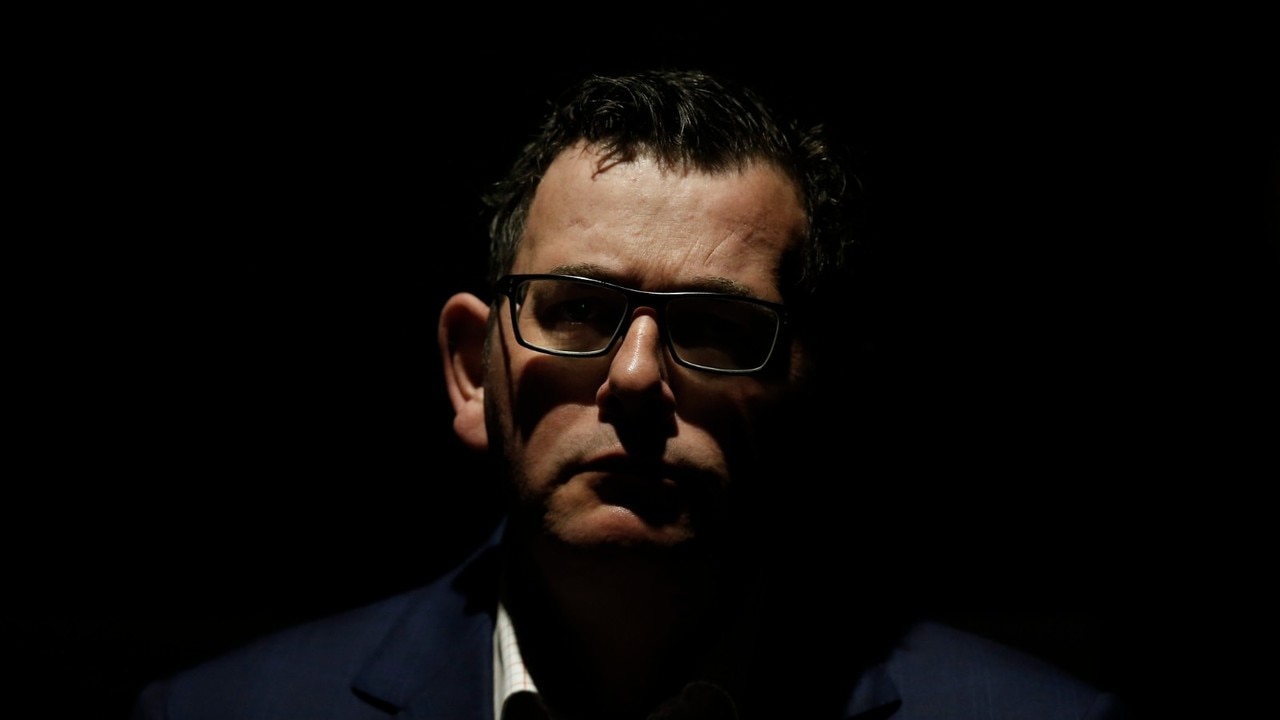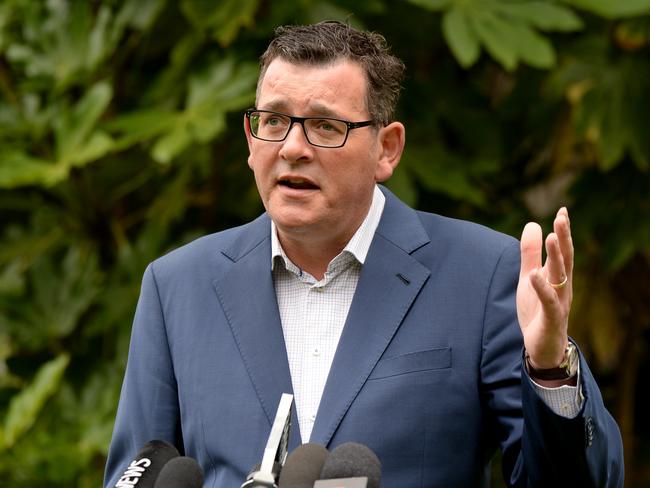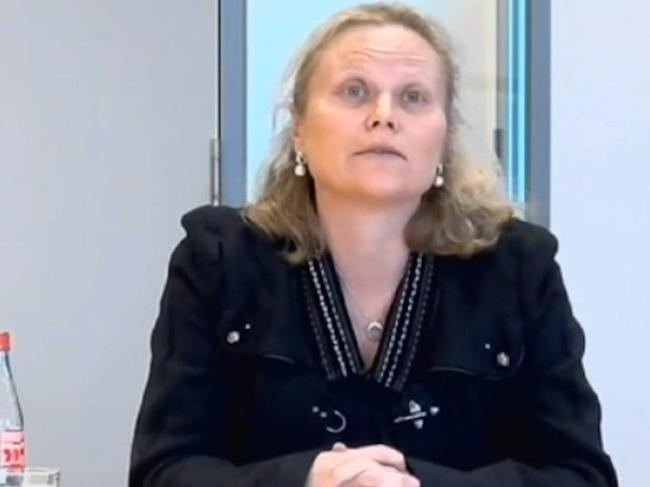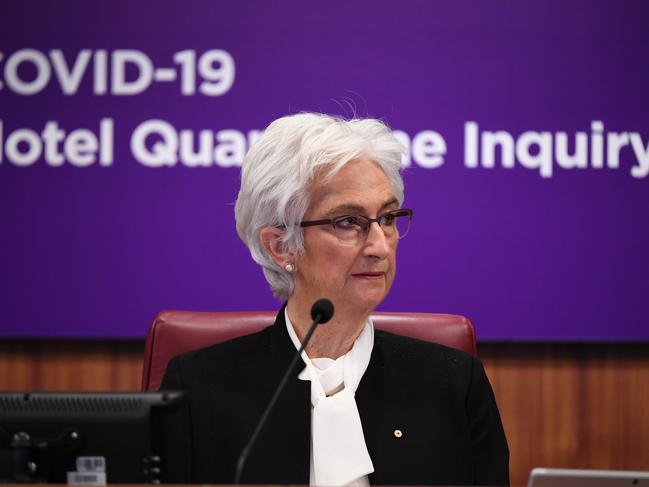Report slams failure of leadership, but Dan Andrews refuses to go
Daniel Andrews says it would be “cowardice’’ for him to resign after the hotel inquiry found his government failed to meet its responsibilities over the botched quarantine program.

Coronavirus
Don't miss out on the headlines from Coronavirus. Followed categories will be added to My News.
Daniel Andrews says it would be “cowardice’’ for him to resign after a sharply critical inquiry found his government failed to meet its responsibilities over the hotel quarantine program that ultimately killed 801 people.
Blaming former health minister Jenny Mikakos and former Department of Health and Human Services secretary Kym Peake, the Premier said he would not be “cutting and running’’.
Former judge Jennifer Coate found the government’s failure to identify who decided to hire private security guards was at odds with the Westminster system of responsible government.
Acknowledging there would be “people missing from the Christmas table on Friday’’ as a result of the failures that sparked Victoria’s deadly second wave of COVID-19, Mr Andrews said he was sorry for those mistakes and would adopt all 81 of the inquiry’s recommendations.
“I’m accountable, I’m a leader of the state … but that cutting and running thing, that’s not accountability, that’s cowardice and you won’t get that from me,’’ he said.
Sebastian Agnello, whose mother Carmela, 92, died during the second wave, expressed deep disappointment, saying the inquiry was “not worth the paper that it’s written on.’’

“He (Mr Andrews) said to the press ‘we’ll wait for an independent assessment and take advice from that’ — but he knows this inquiry was a farce,” Mr Agnello said.
But a defiant Premier, who in July said he took responsibility for the failed process, refused to quit.
“Not only will I not resign, because that is just not who I am, I’ll be on the ballot in 2022 and I’ll be working every day between now and then, and hopefully with the support of the Victorian community beyond that, to do the things we said we would do to make sure we are a stronger economy and community,’’ he said.
Ms Coate found the decision to hire private security guards could not be traced to any individual, and did not happen at ministerial level.
But she criticised the fact Mr Andrews, Ms Mikakos, Police Minister Lisa Neville and Jobs Minister Martin Pakula had no “active role in, or oversight of’’ how hotel quarantine would be enforced.
“On its face, this was at odds with any normal application of the principles of the Westminster system of responsible government,’’ Ms Coate found.
She said the fact that 70,000 documents failed to identify who made the decision was likely to “shock the public.’’

Mr Andrews deflected blame towards Ms Peake and Ms Mikakos, both of whom resigned after giving evidence to the inquiry.
The inquiry found the DHHS failed to accept responsibility as control agency, was slow to react and had “inexplicable internal governance structures that served to complicate and obfuscate reporting lines and accountabilities’’.
“Just as DHHS did not see itself as the control agency responsible for the program, it did not see itself as ‘in charge’ on-site. This left brewing the disaster that tragically came to be,’’ Ms Coate found.
Mr Andrews said: “If the secretary of the department were still here, I’d expect she would be handing me her resignation today, and I would accept it.
“And I think the same would go for the minister.’’
Former chief police commissioner Graham Ashton also came under criticism. Ms Coate rejected his evidence that he had neither been consulted on, nor expressed a preference for, private security to be used instead of police.
Instead, Ms Coate found he was likely to have discussed the issue with former Department of Premier and Cabinet secretary Chris Eccles in a phone call at 1.17pm on March 27.
“I draw the inference that a discussion took place between Mr Ashton and Mr Eccles that caused Mr Ashton to ‘think’ there was a ‘deal’ set up by DPC whereby private security would be used for the program,’’ she found.

“I am satisfied that, while the evidence did not identify a single person who decided to engage private security in the program, there were clearly people who influenced that outcome, which was the position adopted at the SCC meeting at 4.30pm on the afternoon of March 27, 2020.
“I am satisfied that the first of those was Mr Eccles. The second was Mr Ashton.’’
The former top cop told The Australian he did not make the call to use private security but said whoever did covered up their role.
“I was not the decision maker for the use of security guards in the hotel quarantine operation and do not know who was,” he said.
“Disappointingly, that person seems determined to remain anonymous,” he added.
On Monday, Mr Ashton said while he did not make the decision about private security guards, he did not object to their use.
“I did, however, support the decision when informed of it, along with every other person,” Mr Ashton said.
“Nobody raised any concerns about the decision at the time.”
Ms Coate said Victoria Police would have provided a more disciplined and appropriate workforce in the quarantine hotels than private guards.
Mr Andrews said he wished a different decision had been made about the use of private security, but that he had no capacity to direct an independent chief commissioner.
“Do I wish that Victoria Police had perhaps had a different view? Well, again, if you could turn back to the clock, you’d probably do that,’’ he said.
Ms Coate also criticised the Department of Jobs, Precincts and Regions over its decision to hire Unified Security, attacking the hands-off approach of departmental secretary Simon Phemister and Mr Pakula.





